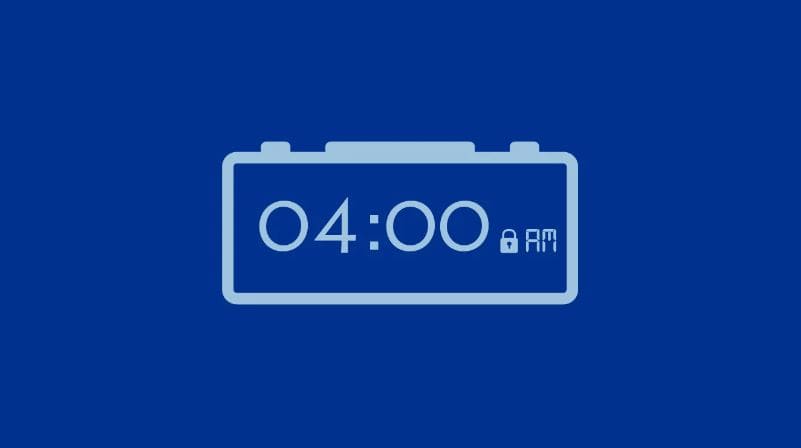Depending on who you are, waking up at 4:00 am might be a blessing or a curse. Some call those early hours the secret to their success, while others see them as their downfall, robbing them of precious sleep.
The dividing line just might be in the form of an alarm clock or, more broadly, your intention. Do you intend to wake up every day at 4:00? If not, this early rising–especially if it means that you’re not getting a full night’s rest–may offer more problems than potential.

In this article, we’ll explore the reasons you might be waking up long before you’re ready, especially when it happens on a regular basis, and what you can do about it to make sure you get all the sleep you need.
What Is it about 4:00 AM
For some people, 4:00 am is an important time. Many high performers sing the praises of the hour, using it to work toward their goals. Because most of the world is still asleep, they can focus in solitude, getting a head start on the day before the rest of us wake up.
Some years ago, there was even a global art project dedicated to the time. The 4am Project was a photo challenge to capture the world at–you guessed it–4:00 in the morning.
Even so, not all of us are productive or inspired by the 4:00 hour. Worse, waking up at that time may mean that we’re not getting a whole night’s rest, which instead puts a damper on our day. If that’s the case, waking up too early is a problem.
When it happens often, waking up too early might even be a big problem, as sleep deprivation is linked to lower performance at work, moodiness and irritability, poor health, an increased risk of accidents and errors, and more.
Waking Up Too Early is Normal—Until It’s Not Everyone wakes up at the wrong time sometimes. These too-early wakings are often caused by happenstance: a siren, loud snoring, or a pet. More often than not, we’re able to fall back asleep.
However, an estimated 35% of people wake up during the night three or more times per week, and 90% of those say that the issue is prolonged, extending over six months or more.
That’s a lot of unwelcome wakings in general, and the closer you get to morning, the harder it seems to be to fall back asleep. If the number of articles mentioning it is any indication, a surprising number of people seem to wake up at or around the 4:00 am mark.
There’s no exact explanation why that time is so common. Anecdotally, however, staying awake after waking up at 4:00 am makes logical sense. On longer days, the sun is starting to rise and brighten the room, alerting our brains that it’s morning, even if we’re not quite ready to accept that fact. It is almost a normal wake-up time for many people, so the body may have been working its way toward being alert anyway.
“It is worth noting, that changes in day length are a factor only in the higher latitudes, not close to the equator,” notes Dr. Nayantara Santhi.
11 Reasons to Explain Why You’re Waking Up at 4:00 AM
While we don’t know what makes us wake up at 4:00 exactly, we do know some of the causes for waking up too early in general.
“In most places 4:00 am, unless it is at the very high and extreme latitudes, is just before dawn,” notes Dr. Nayantara Santhi. “That may be one reason.”
We’ve rounded up 11 of the most common reasons that you might be waking up before your alarm.
- Insomnia
While we think of insomnia as the struggle to fall asleep at night, the condition definition also includes trouble staying asleep (middle insomnia or sleep-maintenance insomnia ) or issues with waking up too early (terminal insomnia).
Poor sleep can be caused by working nights or early mornings, too many daytime naps, stress, drinking caffeine too late in the day, pregnancy, bright lights in the afternoons and evenings, chronic pain, and myriad other issues.
- Stress, Anxiety, and Depression
Psychiatric issues are frequent causes of insomnia and other sleep issues. Stress and anxiety, in particular, raise the level of cortisol in our bodies. Cortisol is the hormone that helps us feel alert and ready to take action, the opposite of what we want for sleep.
Stress is considered a common cause of acute insomnia. And
general anxiety disorder is often linked to middle insomnia, and terminal insomnia is tied to depression.
Nonrestorative sleep, where sleep is not restful, is further linked to these conditions and to waking up more often, possibly because of an increased noise sensitivity.
Unfortunately, insomnia can contribute to a worsening of stress, anxiety, and depression as well, causing a cycle of sleep and impaired mental health that can be hard to break.
- Getting Older
Our sleep changes almost constantly throughout our lives.
Older adults often take longer to fall asleep and wake up more often than younger adults or children. Additionally, they frequently experience changes to their circadian rhythm, as melatonin production slows, and they experience fewer cues that help keep their internal clock on track such as exposure to sunlight. - Hormonal Changes
For women especially, hormonal changes may contribute to sleep disturbances. Pregnancy, perimenopause, and menopause have all been associated with an increase in sleep complaints and an increase in the prevalence of sleep disorders, particularly obstructive sleep apnea and restless leg syndrome. Comfort, or the lack thereof, during pregnancy or menopause can also create additional barriers to falling and staying asleep.
A dysfunctional thyroid can also contribute to hormonal changes that impact sleep. The thyroid is a small gland located in the neck. It releases the hormones T4 (thyroxine) and T3 (triiodothyronine) into the body. When the thyroid is not functioning correctly, changes in sleep duration are common.
- Use of Medications
The use of certain prescription medications have been shown to negatively impact sleep. These include beta-blockers, used to manage blood pressure, and antidepressants used to regulate mood. Diuretics, which help flush out excess salt and water from the body, may also cause more trips to the restroom throughout the night. - Exposure to Too Much Light
External time cue play a big role in maintaining a healthy sleep schedule, particularly the presence or absence of light. In the summer, when days are long, early morning light may trick the body into believing that it’s time to get up.
It’s not just natural light that can interrupt our sleep; artificial light can also rouse us from sleep. Avoiding this light may be particularly challenging for city-dwellers. Street lights, car headlights, and other lights flickering on in the early morning can tell our otherwise sleeping brain that it’s time to wake up.
“Light plays a critical role in our sleep-wake cycle. Light is the strongest time signal for our circadian clock,” notes Dr. Nayantara Santhi. “For most of us, our daily light exposure includes predominantly indoor artificial light, which is constantly available.”
“This is cause for concern, because of the health consequences of disruption of circadian rhythmicity and associated sleep deprivation through exposure to artificial light. Making sure we have enough outdoor natural light during the day and limiting artificial light after dark can go a long way in reducing circadian disturbances and accompanying sleep disruption.”
- Lifestyle
Several lifestyle factors impact our sleep, ranging from how we care for our bodies to how much time we spend in bed.
When we don’t take care of our bodies, it can negatively impact the quality and duration of our sleep. Not getting enough exercise in your day or magnesium in your diet, not drinking enough water or drinking too much at the wrong times, and eating the wrong foods can all cause disruptions to our sleep.
Spending too much time in bed is another lifestyle issue that is all too easy to fall into. When our beds are comfortable, it’s natural to want to spend time there. But when we watch television or relax in bed, our brains don’t associate the bed exclusively with sleep, causing mixed messages about what happens when we crawl under the covers.
Finally, room temperature changes are a common cause of early mornings, as the thermometer shifts indoors and out. If the temperature is not regulated, you might overheat or become too cold, both of which can wake you from sleep.
- Pain
Musculoskeletal pain is associated with both short (less than five hours) and long (more than 9 hours) sleep durations. Acute or chronic, being in pain can make it difficult to fall asleep or stay asleep. When severe, pain may wake us from a deep sleep and keep us from going back to sleep afterward. - Low Blood Sugar
As with pain, the risk of diabetes relative to the amount of sleep goes in two directions: getting less than seven hours or more than eight hours of sleep is linked to a higher risk of developing the condition. In addition, episodes of hypoglycemia can wake us from sleep. As blood sugar levels drop to lower-than-normal levels, the body responds with the release of hormones including epinephrine and cortisol, which often cause us to wake up. - Sleep Apnea
Sleep apnea is a condition in which a person stops breathing many times throughout the night. It can be caused by an obstruction in the airway or a misfiring of the brain. In either case, the brain works to restart the breath by waking us up.
Most of the time, sleep apnea sufferers don’t even notice those awakenings, even though there can be hundreds in a night. However, sometimes the disruption–and the timing of it–might be enough to pull you into full awareness.
- Circadian Rhythm Disorders
For people with circadian rhythm disorders, the body’s internal clock is not aligned with the environmental clock.
For people with Advanced Sleep Phase Syndrome (ASPS), the sleep-wake cycle starts and ends two or more hours earlier than normal. Those with Irregular Sleep-Wake Rhythm Disorder frequently do not follow the typical sleep-wake schedule at all. Both of these conditions can cause you to wake up early in the morning.
How to Stop Those 4:00 am Wakings
If none of the reasons listed above apply to you, there may be another reason for your early morning wakings. It’s also possible that you’re just an early riser. If you regularly wake up at an early (but still fairly reasonable) hour but feel well-rested and ready for the day, 4:00 am might not be a problem for you at all.
Either way, there are steps you can take to shift your sleep schedule, helping you stay asleep until you’re actually ready to get out of bed.
Improve Your Sleep Environment
Where and how we sleep is often critical to ensuring that we fall and stay asleep. Some tips to help you create an environment supportive to sound sleep include:
Regulate temperature throughout the night: Maintain a comfortable room temperature all night long to keep you from becoming too hot or too cold while you’re asleep.
Manage light: Hang light-blocking curtains to manage sun or street light, dim overhead lights in the evening, and make sure you get plenty of bright sunlight in the early part of the day. Don’t forget to put your devices away before bedtime too–that blue light is just as guilty for causing poor sleep.
Ensure sleep comfort: invest in good bedding, a quality mattress, and comfortable pillows to ensure that you stay cozy and comfortable all night long.
Work on Your Sleep Hygiene
Sleep hygiene is the set of practices we engage in to support our sleep health. Good sleep hygiene goes a long way in helping to ensure good sleep, including:
Go to bed at the same time every night: Establish a consistent sleep cycle, which helps train your circadian rhythm and your body to fall asleep at the right time and stay asleep.
Make lifestyle changes: Get more exercise, eat healthy foods that don’t cause indigestion, drink plenty of water throughout the day, and manage stress to help keep your body and mind in tip-top shape for sleep.
Try light therapy: This practice involves the intentional exposure to bright light in the mornings. Light therapy is often done with a light therapy box, but even spending time outside in the sun can help regulate the hormones that make you sleepy and awake at the right times.
Adjust your schedule to match: If waking up at 4:00 in the morning doesn’t bother you, or if you’re trying to give that early-morning productivity a try, make sure to adjust the rest of your schedule to match.
Turn off lights and devices, start your end-of-night routine, and go to bed a little bit earlier than before to ensure that you’re getting enough rest before your early morning wake-up call.
When to Talk to Your Doctor
If your sleep issues are persistent, or if you believe another serious factor may be impacting your ability to fall and stay asleep, you may want to consult with your doctor.
Chronic sleep issues can cause or perpetuate many physical and emotional symptoms, including:
Lack of focus or concentration
Excessive daytime sleepiness
Low energy
Difficulty making decisions
Moodiness/irritability
Increased risk of errors and accidents
Impaired immune system function
Increased risk for certain conditions and diseases
Your doctor may request a sleep study, do a physical exam, or work to identify and rule out any other potential diagnoses that may be impacting your sleep. Often, they’ll request that you keep a sleep diary for a couple of weeks, tracking when you go to bed, how long it takes you to fall asleep, and when you wake up, whether it’s at 4:00 am, another time, or even multiple times throughout the night.
Frequently Asked Questions
Why do I wake up at the same time every night?
Waking up at the same time every night may be a byproduct of your circadian rhythms. These patterns are determined by a number of environmental and genetic factors and they affect when we tend to wake up and when we feel sleepy. If you find yourself waking up at night and unable to easily fall back asleep, you may need to speak with a sleep specialist about potential circadian rhythm disorders.
What are the benefits of waking up at 4 am?
If you find yourself naturally waking up early at 4 or 5 a.m., you may want to consider making it your new start time. An early start time is a good way to accomplish numerous tasks, such as a morning workout or a beloved hobby. You will need to correspondingly go to bed earlier to feel fully refreshed and rested, and can use a sleep calculator to figure out your ideal bedtime.
How can I stop waking up early?
The first step to make sure you don’t wake up too early is to set up your bedroom for uninterrupted sleep. This means taking steps to ensure it’s cool, dark, and quiet. Blackout curtains can keep outside light from filtering in, while small blinking lights from a clock or other electronic devices should be covered or removed from the room entirely.
Regular exercise can also help you sleep better, as can limiting your caffeine intake in the early afternoon and evening hours.
How can I fall back asleep after waking up?
Taking a few calming breaths can be helpful, particularly if you’ve woken up from a bad dream. Avoid looking at the clock and dwelling on what time it is, as this can create feelings of anxiety that make it difficult to fall back asleep. Similarly, you want to resist any temptation to look at your phone, as the light will only wake you up more.
Lastly, it’s important to know when to give up on going back to sleep. For example, if you find yourself waking up within 45 minutes of your usual start time, you may just want to go ahead and get up. Doing so will prevent you from oversleeping, which can interfere with your overall sleep schedule.
Is it normal to wake up during the night?
Yes, many people wake up during the middle of the night. The idea of sleeping throughout the night without any interruptions is an idealized version of sleep that often doesn’t match up with reality. Prolonged time spent awake during the night, however, can be a symptom of insomnia.
If you’re concerned about your sleeping habits, it’s best to speak with your doctor or a sleep specialist.
Conclusion
Waking up at 4:00 am might be great for your to-do list, but if it’s causing you to lose out on sleep, it’s going to do more harm than good. Consistent too-early wake-up times are often a sign that something is awry, whether it’s your lifestyle or a sleep disorder. By managing those issues, you are more likely to stay asleep the whole night, waking at the right time.




